- Home
- J. G. Ballard
Chronopolis
Chronopolis Read online
CHRONOPOLIS
and
Other Stories
by
J. G. Ballard
A Berkley Book
COPYRIGHT © 1971 BY J. G. BALLARD
All rights reserved. This book, or parts thereof, must not be reproduced in any form without permission.
Published simultaneously in Canada by Longmans Canada Limited, Toronto.
The Voices of Time Copyright © 1960. First published in New Worlds Science Fiction.
The Drowned Giant Copyright © 1965 by HMH Publications. (This story published originally under the title “Souvenir” in Playboy.)
The Terminal Beach Copyright © 1964 by Nova Publications Ltd., London. First published in New Worlds Science Fiction.
Manhole 69 Copyright © 1957 by Nova Publications Ltd., London. First published in New Worlds Science Fiction.
Storm-Bird, Storm-Dreamer Copyright © 1966 by J. G. Ballard. First published in New Worlds Science Fiction.
The Sound-Sweep Copyright © 1960 by Nova Publications Ltd., London, for Science Fantasy.
Billenium Copyright © 1961. First published in New Worlds Science Fiction.
Chronopolis Copyright © 1961 by Nova Publications Ltd., London, for New Worlds Science Fiction.
Build-Up Copyright © 1960 by Nova Publications Ltd., London, for New Worlds Science Fiction.
The Garden of Time Copyright © 1962 by Mercury Press Inc., for The Magazine of Fantasy and Science Fiction.
End Game Copyright © 1963 by Nova Publications Ltd., London. First published in New Worlds Science Fiction.
The Watchtowers Copyright © 1962 by Nova Publications Ltd., London. First published in Science Fantasy.
Now Wakes the Sea Copyright © 1963 by Mercury Press Inc. First published in Fantasy and Science Fiction.
Zone of Terror Copyright © 1960. First published in New Worlds Science Fiction.
The Cage of Sand Copyright © 1962 by Nova Publications Ltd., London. First published in New Worlds Science Fiction.
Deep End Copyright © 1961 by Nova Publications Ltd., for New Worlds Science Fiction.
PRINTED IN THE UNITED STATES OF AMERICA.
Contents
The Voices of Time
The Drowned Giant
The Terminal Beach
Manhole 69
Storm-Bird, Storm-Dreamer
The Sound-Sweep
Billenium
Chronopolis
Build-Up
The Garden of Time
End Game
The Watchtowers
Now Wakes the Sea
Zone of Terror
The Cage of Sand
Deep End
The Voices of Time
One
Later Powers often thought of Whitby, and the strange grooves the biologist had cut, apparently at random, all over the floor of the empty swimming pool. An inch deep and twenty feet long, interlocking to form an elaborate ideogram like a Chinese character, they had taken him all summer to complete, and he had obviously thought about little else, working away tirelessly through the long desert afternoons. Powers had watched him from his office window at the far end of the neurology wing, carefully marking out his pegs and string, carrying away the cement chips in a small canvas bucket. After Whitby’s suicide no one had bothered about the grooves, but Powers often borrowed the supervisor’s key and let himself into the disused pool, and would look down at the labyrinth of moldering gullies, half-filled with water leaking in from the chlorinator, an enigma now past any solution.
Initially, however, Powers was too preoccupied with completing his work at the Clinic and planning his own final withdrawal. After the first frantic weeks of panic he had managed to accept an uneasy compromise that allowed him to view his predicament with the detached fatalism he had previously reserved for his patients. Fortunately he was moving down the physical and mental gradients simultaneously—lethargy and inertia blunted his anxieties, a slackening metabolism made it necessary to concentrate to produce a connected thought-train. In fact, the lengthening intervals of dreamless sleep were almost restful. He found himself beginning to look forward to them, and made no effort to wake earlier than essential.
* * *
At first he had kept an alarm clock by his bed, and tried to compress as much activity as he could into the narrowing hours of consciousness, sorting out his library, driving over to Whitby’s laboratory every morning to examine the latest batch of X-ray plates, every minute and hour rationed like the last drops of water in a canteen.
Anderson, fortunately, had unwittingly made him realize the pointlessness of this course.
After Powers had resigned from the Clinic he still continued to drive in once a week for his check-up, now little more than a formality. On what turned out to be the last occasion Anderson had perfunctorily taken his blood count, noting Powers’ slacker facial muscles, fading pupil reflexes, the unshaven cheeks.
He smiled sympathetically at Powers across the desk, wondering what to say to him. Once he had put on a show of encouragement with the more intelligent patients, even tried to provide some sort of explanation. But Powers was too difficult to reach—neurosurgeon extraordinary, a man always out on the periphery, only at ease working with unfamiliar materials. To himself he thought; Vm sorry, Robert. What can 1 say—‘Even the sun is growing cooler—'? He watched Powers drum his fingers restlessly on the enamel desk top, his eyes glancing at the spinal level charts hung around the office. Despite his unkempt appearance—he had been wearing the same unironed shirt and dirty white sneakers a week ago—Powers looked composed and self-possessed, like a Conrad beachcomber more or less reconciled to his own weaknesses.
“What are you doing with yourself, Robert?” he asked. “Are you still going over to Whitby’s lab?”
“As much as I can. It takes me half an hour to cross the lake, and I keep on sleeping through the alarm clock. I may leave my place and move in there permanently.”
Anderson frowned. “Is there much point? As far as I could make out Whitby’s work was pretty speculative—” He broke off, realizing the implied criticism of Powers’s own disastrous work at the Clinic, but Powers seemed to ignore this, was examining the pattern of shadows on the ceiling. “Anyway, wouldn’t it be better to stay where you are, among your own things, read through Toynbee and Spengler again?”
Powers laughed shortly. “That’s the last thing I want to do. I want to forget Toynbee and Spengler, not try to remember them. In fact, Paul, I’d like to forget everything. I don’t know whether I’ve got enough time, though. How much can you forget in three months?”
“Everything, I suppose, if you want to. But don’t try to race the clock.”
Powers nodded quietly, repeating this last remark to himself. Racing the clock was exactly what he had been doing. As he stood up and said good-bye to Anderson he suddenly decided to throw away his alarm clock, escape from his futile obsession with time. To remind himself he unfastened his wristwatch and scrambled the setting, then slipped it into his pocket. Making his way out to the car park he reflected on the freedom this simple act gave him. He would explore the lateral byways now, the side doors, as it were, in the corridors of time. Three months could be an eternity.
He picked his car out of the line and strolled over to it, shielding his eyes from the heavy sunlight beating down across the parabolic sweep of the lecture theater roof. He was about to climb in when he saw that someone had traced with a finger across the dust caked over the windshield:
96,688,365,498,721
Looking over his shoulder, he recognized the white Packard parked next to him, peered inside and saw a lean-faced young man with blond sun-bleached hair and a high cerebrotonic forehead watching him behind dark glasses. Sitting beside him at t
he wheel was a raven-haired girl whom he had often seen around the psychology department. She had intelligent but somehow rather oblique eyes, and Powers remembered that the younger doctors called her “the girl from Mars.”
“Hello, Kaldren,” Powers said to the young man. “Still following me around?”
Kaldren nodded. “Most of the time, Doctor.” He sized Powers up shrewdly. “We haven’t seen very much of you recently, as a matter of fact. Anderson said you’d resigned, and we noticed your laboratory was closed.”
Powers shrugged. “I felt I needed a rest. As you’ll understand, there’s a good deal that needs rethinking.”
Kaldren frowned half-mockingly. “Sorry to hear that, Doctor. But don’t let these temporary setbacks depress you.” He noticed the girl watching Powers with interest. “Coma’s a fan of yours. I gave her your papers from American Journal of Psychiatry, and she’s read through the whole file.”
The girl smiled pleasantly at Powers, for a moment dispelling the hostility between the two men. When Powers nodded to her she leaned across Kaldren and said: “Actually I’ve just finished Noguchi’s autobiography—the great Japanese doctor who discovered the spirochete. Somehow you remind me of him—there’s so much of yourself in all the patients you worked on.”
Powers smiled wanly at her, then his eyes turned and locked involuntarily on Kaldren’s. They stared at each other somberly for a moment, and a small tic in Kaldren’s right cheek began to flicker irritatingly. He flexed his facial muscles, after a few seconds mastered it with an effort, obviously annoyed that Powers should have witnessed this brief embarrassment.
“How did the clinic go today?” Powers asked. “Have you had any more . . . headaches?”
Kaldren’s mouth snapped shut; he looked suddenly irritable. “Whose care am I in, Doctor? Yours or Anderson’s? Is that the sort of question you should be asking now?”
Powers gestured deprecatingly. “Perhaps not.” He cleared his throat; the heat was ebbing the blood from his head and he felt tired and eager to get away from them. He turned toward his car, then realized that Kaldren would probably follow, either try to crowd him into the ditch or block the road and make Powers sit in his dust all the way back to the lake. Kaldren was capable of any madness.
“Well, I’ve got to go and collect something,” he said, adding in a firmer voice, “Get in touch with me, though, if you can’t reach Anderson.”
He waved and walked off behind the line of cars. Reflected in the windows he could see Kaldren looking back and watching him closely.
He entered the neurology wing and paused thankfully in the cool foyer, nodding to the two nurses and the armed guard at the reception desk. For some reason the terminals sleeping in the adjacent dormitory block attracted hordes of would-be sightseers, most of them cranks with some magical antinarcoma remedy, or merely the idly curious, but a good number of quite normal people, many of whom had traveled thousands of miles, impelled toward the clinic by some strange instinct, like animals migrating to a preview of their racial graveyards.
He walked along the corridor to the supervisor’s office overlooking the recreation deck, borrowed the key and made his way out through the tennis courts and calisthenics rigs to the enclosed swimming pool at the far end. It had been disused for months, and only Powers’s visits kept the lock free. Stepping through, he closed it behind him and walked past the peeling wooden stands to the deep end.
Putting a foot up on the diving board, he looked down at Whitby’s ideogram. Damp leaves and bits of paper obscured it, but the outlines were just distinguishable. It covered almost the entire floor of the pool and at first glance appeared to represent a huge solar disk, with four radiating diamond-shaped arms, a crude Jungian mandala.
Wondering what had prompted Whitby to carve the device before his death, Powers noticed something moving through the debris in the center of the disk. A black, horny-shelled animal about a foot long was nosing about in the slush, heaving itself on tired legs. Its shell was articulated, and vaguely resembled an armadillo’s. Reaching the edge of the disk, it stopped and hesitated, then slowly backed away into the center again, apparently unwilling or unable to cross the narrow groove.
Powers looked around, then stepped into one of the changing booths and pulled a small wooden clothes locker off its rusty wall bracket. Carrying it under one arm, he climbed down the chromium ladder into the pool and walked carefully across the slithery floor toward the animal. As he approached, it sidled away from him, but he trapped it easily, using the lid to lever it into the box.
The animal was heavy, at least the weight of a brick. Powers tapped its massive olive-black carapace with his knuckle, noting the triangular warty head jutting out below its rim like a turtle’s, the thickened pads beneath the first digits of the pentadactyl forelimbs.
He watched the three-lidded eyes blinking at him anxiously from the bottom of the box.
“Expecting some really hot weather?” he murmured. “That lead umbrella you’re carrying around should keep you cool.”
He closed the lid, climbed out of the pool and made his way back to the supervisor’s office, then carried the box out to his car.
“. . . Kaldren continues to reproach me (Powers wrote in his diary). For some reason he seems unwilling to accept his isolation, is elaborating a series of private rituals to replace the missing hours of sleep. Perhaps I should tell him of my own approaching zero, but he'd probably regard this as the final unbearable insult, that 1 should have in excess what he so desperately yearns for. God knows what might happen.
Fortunately the nightmarish visions appear to have receded for the time being. . .
Pushing the diary away, Powers leaned forward across the desk and stared out through the window at the white floor of the lake bed stretching toward the hills along the horizon. Three miles away, on the far shore, he could see the circular bowl of the radio-telescope revolving slowly in the clear afternoon air, as Kaldren tirelessly trapped the sky, sluicing in millions of cubic parsecs of sterile ether, like the nomads who trapped the sea along the shores of the Persian Gulf.
Behind him the air-conditioner murmured quietly, cooling the pale blue walls half-hidden in the dim light. Outside the air was bright and oppressive, the heat waves rippling up from the clumps of gold-tinted cacti below the Clinic, blurring the sharp terraces of the twenty-story neurology block. There, in the silent dormitories behind the sealed shutters, the terminals slept their long dreamless sleep. There were now over five hundred of them in the Clinic, the vanguard of a vast somnambulist army massing for its last march. Only five years had elapsed since the first narcoma syndrome had been recognized, but already huge government hospitals in the east were being readied for intakes in the thousands, as more and more cases came to light.
Powers felt suddenly tired, and glanced at his wrist, wondering how long he had till eight o’clock, his bedtime for the next week or so. Already he missed the dusk, and he knew he would soon wake to his last dawn.
His watch was in his hip pocket. He remembered his decision not to use his timepieces, and sat back and stared at the bookshelves beside the desk. There were rows of green-covered AEC publications he had removed from Whitby’s library, papers in which the biologist described his work out in the Pacific after the H-tests. Many of them Powers knew almost by heart; he had read them a hundred times in an effort to grasp Whitby’s last conclusions. Toynbee would certainly be easier to forget.
His eyes dimmed momentarily, as the tall black wall in the rear of his mind cast its great shadow over his brain. He reached for the diary, thinking of the girl in Kaldren’s car—Coma, he had called her, another of his insane jokes—and her reference to Noguchi. Actually the comparison should have been made with Whitby, not himself; the monsters in the lab were nothing more than fragmented mirrors of Whitby’s mind, like the grotesque radio-shielded frog he had found that morning in the swimming pool.
Thinking of the girl Coma, and the heartening smile she had given him, he
wrote:
Woke 6:33 a.m. Last session with Anderson. He made it plain he's seen enough of me, and from now on I'm better alone. To sleep 8:00? (These countdowns terrify me.)
He paused, then added:
Good-bye, Eniwetok.
Two
He saw the girl again the next day at Whitby’s laboratory. He had driven over after breakfast with the new specimen, eager to get it into a vivarium before it died. The only previous armored mutant he had come across had nearly broken his neck. Speeding along the lake road a month or so earlier he had struck it with the off-side front wheel, expecting the small creature to flatten instantly. Instead its hard lead-packed shell had remained rigid, even though the organism within it had been pulped, and the impact had flung the car heavily into the ditch. He had gone back for the shell, later weighed it at the laboratory, found it contained over six hundred grams of lead.
Quite a number of plants and animals were building up heavy metals as radiological shields. In the hills behind the beach house a couple of old-time prospectors were renovating the derelict gold-panning equipment abandoned over eighty years ago. They had noticed the bright yellow tints of the cacti, run an analysis and found that the plants were assimilating gold in extractable quantities, although the soil concentrations were unworkable. Oak Ridge was at last paying a dividend!
Waking that morning just after 6:45—ten minutes later than the previous day (he had switched on the radio, heard one of the regular morning programs as he climbed out of bed)—he had eaten a light unwanted breakfast, then spent an hour packing away some of the books in his library, crating them up and taping on address labels to his brother.

 High-Rise
High-Rise The Drowned World
The Drowned World The Unlimited Dream Company
The Unlimited Dream Company Running Wild
Running Wild The Day of Creation
The Day of Creation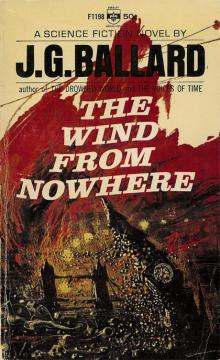 The Wind From Nowhere
The Wind From Nowhere The Complete Short Stories, Volume 2
The Complete Short Stories, Volume 2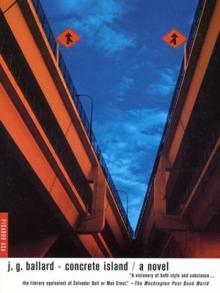 Concrete Island
Concrete Island Empire of the Sun
Empire of the Sun The Kindness of Women
The Kindness of Women Vermilion Sands
Vermilion Sands Super-Cannes
Super-Cannes Millennium People
Millennium People The Complete Stories of J. G. Ballard
The Complete Stories of J. G. Ballard Crash
Crash The Drought
The Drought The Atrocity Exhibition
The Atrocity Exhibition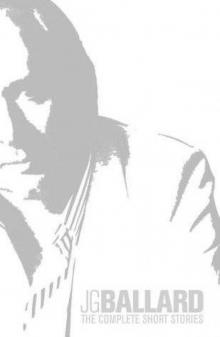 The Complete Short Stories: Volume 1
The Complete Short Stories: Volume 1 Miracles of Life: Shanghai to Shepperton: An Autobiography
Miracles of Life: Shanghai to Shepperton: An Autobiography Rushing to Paradise
Rushing to Paradise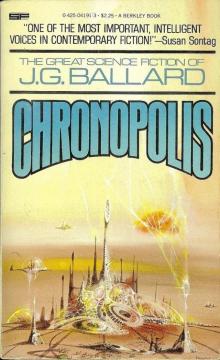 Chronopolis
Chronopolis Cocaine Nights
Cocaine Nights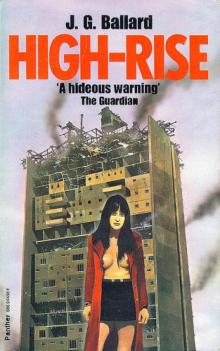 High Rise (1987)
High Rise (1987) The Complete Short Stories
The Complete Short Stories The Day of Creation (Harper Perennial Modern Classics)
The Day of Creation (Harper Perennial Modern Classics) The Crystal World
The Crystal World